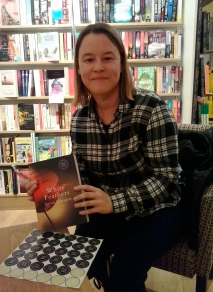Lucia's War
By Susan Lanigan
London, 1949.
Opera singer Lucia Percival is due to perform her last concert. But she has no intention of going onstage. A terrible secret from the First World War has finally caught up with her.
London, 1917.
London, 1917.
Lucia, a young Jamaican exile, hopes to make it as a musician. But her past haunts her, and when she meets Lilian, an old woman damaged by war, she agrees to a pact that could destroy everything she has fought so hard for.
From the Western Front and Glasgow, to black society in London, Lucia’s story tells a tale of music, motherhood, loss and redemption.
From the Western Front and Glasgow, to black society in London, Lucia’s story tells a tale of music, motherhood, loss and redemption.
"Did you know I once sang Wagner to a roomful of Nazis?"
It wasn't the most conventional way to start an interview with a music critic, but then, no one had ever called Lucia Percival conventional. And it wasn't as if this man's opinion mattered, for this was to be Lucia's last concert.
Of course, the Nazis had not realised that it was not an Aryan goddess singing behind the curtained booth. It was amusing when one thought about it. But that is all water under the bridge, at least, it should be. If only it were so easy to let one's past wash away with the current.
Everyone has secrets, stains upon their soul — that was what life did to you sometimes. However, the past had an awful habit of catching up with you when you least expect it. Better for Lucia to tell someone the whole story from her point of view before someone else did it for her…
From the dark, despairing depths of the Firth of Clyde to the glitter of the stage, Lucia's War by Susan Lanigan is the evocative story of a young Jamaican exile who dared to present herself to a world that was not ready for her.
With the passion of a subterranean fire desperate to explode into the world with a deafening crescendo that would forever shake the foundations of the earth, comes a story that would not seem out of place in one of Strauss' operas, Lucia's War is a novel that is as sensational as it is brilliant. With a lavish sense of flair, Lanigan throws her readers into a world of racial inequalities, where the colour of your skin mattered more than the colour of your soul, even if one did bleed the same colour red on the battlefield. It is a world of war and deprivation, broken promises, and disappointments. But above everything else, it is the story of a mother's love and the desperate desire to storm the music world, shake it to its very core, and show everyone that a young Jamaican exile had what it takes to become a superstar.
Oh, this book, where do I even begin? This is a story that swept me away in all of its brilliance. With soaring arpeggio's that scream of disaster and triumph seemingly in the same breath, Lucia's War is a novel that mesmerises. Lanigan has done the impossible and somehow weaved the language of music into this evocative story in such a way that it was almost as if I was listening to a poignant symphony that was as beautiful as it was violent.
The heroine of this story is the young Lucia Percival whose head is filled with music and dreams, and yet she faces the horrors of war, the abandonment by the man she loves, and the despairing loss of a child — a child she would have given up everything for. Lucia makes some bad decisions, but she is young, the world is at war and tomorrow isn't promised. However, despite her suffering, despite her loss, she can find some escape in her music. But even then, she is faced with almost insurmountable opposition because of the colour of her skin. Lucia fears that all her dreams will go up in ashes and fall like burnt confetti from the sky. I could not help but adore Lucia. She finds herself in some really impossible situations, and she makes the mistake of letting others dictate to her and tell her what to do. Although Lucia comes across as a very strong character, she really isn't. She is desperately unhappy and yearning for something that is always just out of reach. At times, the things Lucia has to go through really broke my heart and I found myself reaching for the tissues. Lucia's story is so poignantly tragic, but then the best operas are.
There are several secondary characters to this story, and they all bring something bittersweet to the narrative, but as well as that they help Lanigan depict the very essence of the era. Eva Downey's story is desperately tragic — how I cried for this character. The guilt she feels at giving the love of her life a white feather during the war means she is dying a death more agonising then he did. I feared for Eva's wellbeing on more than one occasions. She is this wonderful young lady whose dreams died the day Christopher did. Eva is a direct contrast to Lucia who, despite her grief, is still daring to dream — Eva got off that particular train a long time ago. I thought Eva was beautifully portrayed.
The men in Lucia's life do not come away from their relationship with her unscathed. Robin Mackenzie loves where he should not, he is white, Lucia is coloured, and unfortunately, society dictated that the two of them had no business together, even though they were so well suited. I think Lucia would have had a very happy life with him in another time and another place, and that knowledge is heart-breaking. I thought Robin's depiction was fabulous. He is broken by the end of this novel all because he could not love where he wanted.
The other man in Lucia's life is the dashingly handsome composer, Arthur Rosewell. Unlike with Robin, there are no racial barriers to him and Lucia being together, but there are emotional ones. There is also a sense of a shadow of a love triangle between Lucia, Arthur and Robin, which none of them can seemingly escape from. Arthur is a very honourable man, and he wants Lucia to succeed. However, he wants it on his terms, and that was never going to happen. I think by contrasting the two very different men, Lanigan shows the readers the despair that comes from loving a woman who marches to a beat only she can hear.
We do meet some historical characters in this book, most notably the Irish poet, W. B. Yeats, but it is the attention to the historical detail where Lanigan excels. Like all gifted historical fiction authors, Lanigan has portrayed the era this book is set in seemingly without any effort. This is incredibly hard to pull off, but Lanigan has done it most admirably. The hours of research that have so obviously gone into this book is staggering, but it was so worth it. Bravo, Ms Lanigan.
Lucia's War by Susan Lanigan is an exceptional work of scholarship. It is in all ways a historical fiction masterpiece. This is a book that is deserving of your time.
I Highly Recommend.
Pre-order your copy of
Lucia's War
Susan Lanigan
Susan Lanigan graduated from Trinity College Dublin with a degree in English and History in the late 90s, then pursued a Graduate Diploma in I.T. in Dublin City University and a Masters in Writing in NUI Galway.
Susan’s first novel White Feathers, a tale of passion, betrayal and war, was selected as one of the final ten in the Irish Writers Centre Novel Fair, 2013, and published in 2014 by Brandon Books. In spite of considerable adversity in her native country, the book won critical acclaim and was shortlisted for the UK Romantic Novel of the Year Award in 2015.















